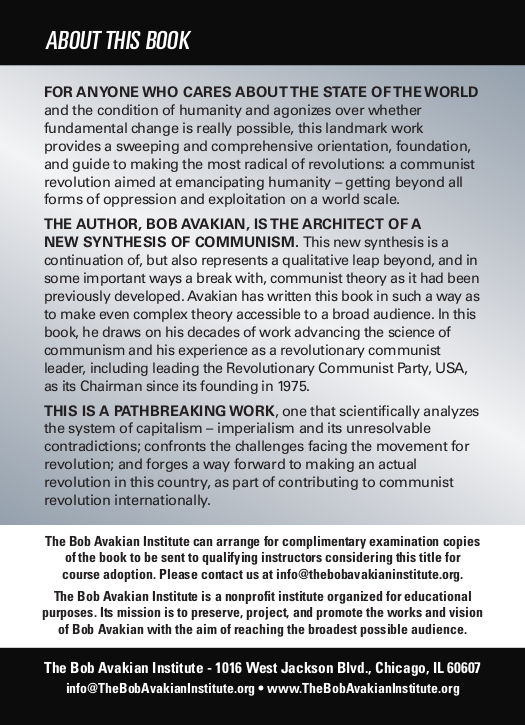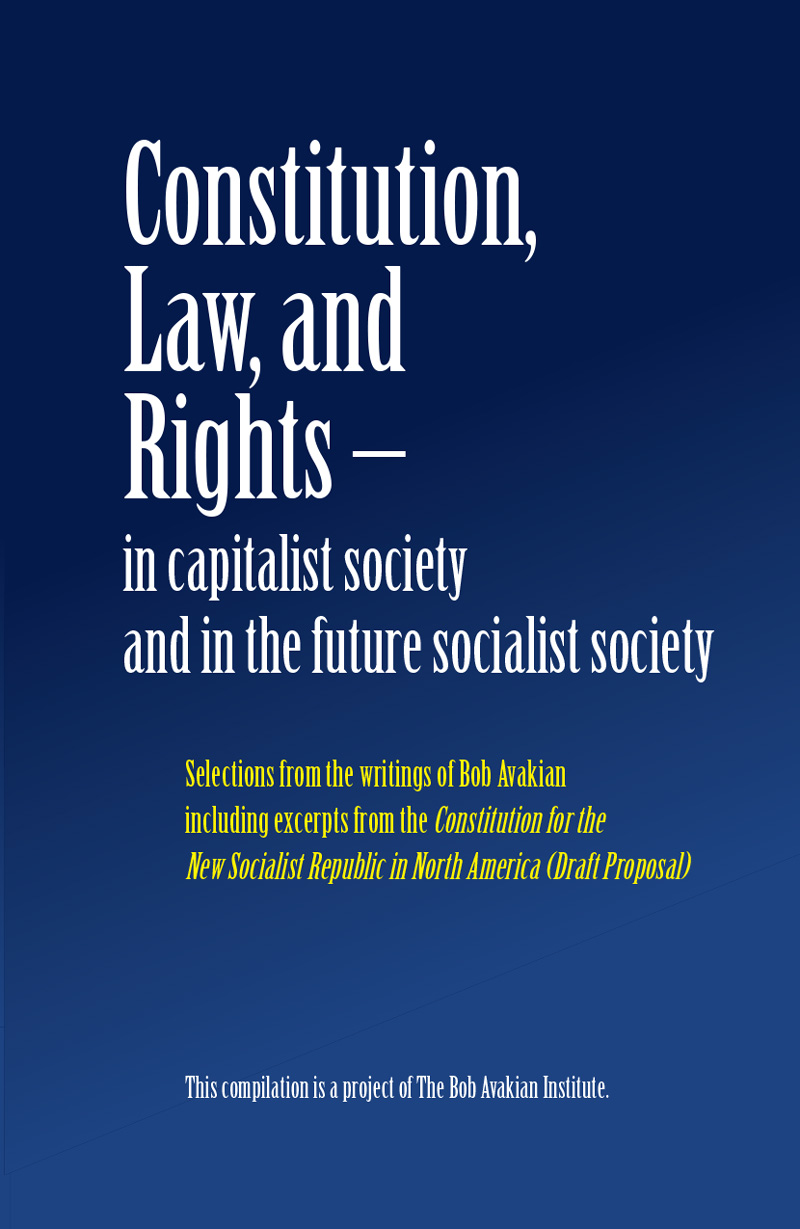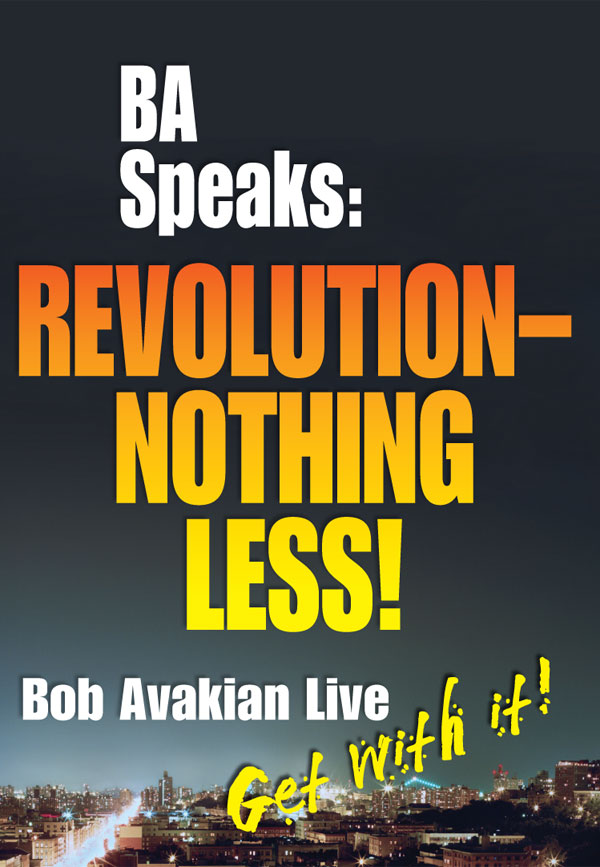Taking Bob Avakian’s New Synthesis of Communism to Academic Sociology Conferences
"Wow, I've never thought of that..."
by Annie Day
September 5, 2016 | Revolution Newspaper | revcom.us
Palm card (front and back) distributed by The Bob Avakian Institute
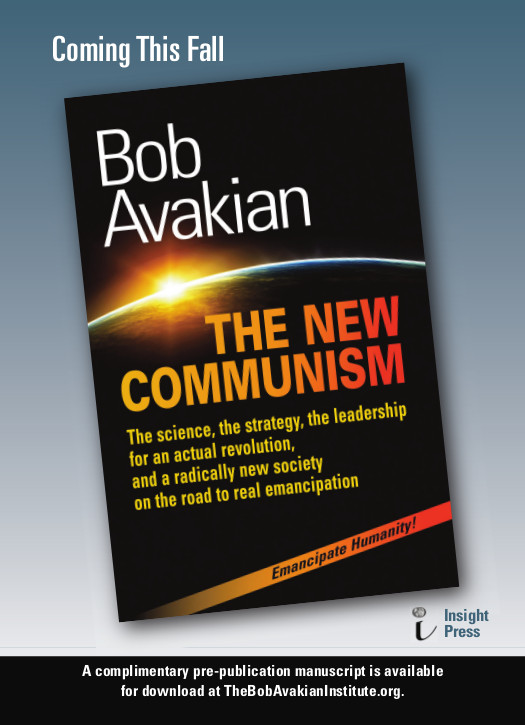
Click image to enlarge
Available Now
For individual orders: at Revolution Books NYC, Revolution Books Berkeley, and Insight Press
Will be available soon at: Amazon, Barnes & Noble, and independent bookstores
For "Buy 2 at a discount with second one sent to a prisoner" and bulk orders: Contact Insight Press, info@insight-press.com or (773) 329-1699. Payment accepted via credit card or money order. Or write Insight Press, 4044 N. Lincoln Ave., #264, Chicago, IL 60618
Booksellers and Book Clubs: Contact Independent Publishers Group (IPG), Baker & Taylor, Ingram and other wholesalers.
Pre-publication PDF of this major work available here.
Last week, I joined a few volunteers with The Bob Avakian Institute to attend two academic conferences of sociologists that were happening back-to-back. There were thousands of people there digging into a whole range of important questions: the environmental disaster, the study of social movements, mass incarceration and the role of the police, the history of capitalism and slavery, the rise of Islamic fundamentalism, the different forms the oppression of women is taking internationally, the conditions of immigrants and refugees, and much more. Some of these sociologists were aiming to study questions from a more theoretical vantage point and others were working to have their studies lead to more concrete policy changes. There were grad students working on their PhDs to prominent academics from all across the country, and some internationally. In line with the mission of The BA Institute, we went with the aim of promoting the serious engagement with the new synthesis of communism which represents a revolution in human thought.
We distributed palm cards announcing the upcoming release of THE NEW COMMUNISM, in addition to a couple dozen pre-publication manuscripts of the new work. We also gave out a lot of copies of “The New Synthesis of Communism: Fundamental Orientation, Method and Approach, and Core Elements,” which provides an outline of the new synthesis. And we also got out a number of Avakian’s other core works.
We spoke up from the floor in about 40 panels, introducing ourselves as volunteers with The Bob Avakian Institute, wielding a quote from BA in relation to what was on the floor, posing a question or point of struggle and sometimes directly speaking to the need for people to get into BA (which was often tied in directly to letting people know that he’s written a Constitution for the New Socialist Republic in North America) at times when people directly said things like, “We don’t know the answer or the way out.” These were very important interventions and a number of times reframed the whole discussion. Usually after these interventions, people would come up to us, thanking us for our comments, wanting to know more, and we were able to get into the discussion and debate more deeply with people.
We spoke with a lot of professors and grad students individually about the content of Avakian’s work, the fact that this is someone on the level of Marx who has put communism on a more thoroughly scientific foundation. Most sociologists are familiar with Marx’s work to some degree and were interested in the questions of epistemology and the world-historic breakthroughs Avakian has made in that regard. In speaking to this, we often quoted directly from how Avakian himself describes the significance of the new synthesis. That it “represents and embodies a qualitative resolution of a critical contradiction that has existed within communism in its development up to this point, between its fundamentally scientific method and approach, and aspects of communism which have run counter to this.” Some people knew Avakian’s name but had never read his theoretical work, and most didn’t know that he’s spent decades working on the biggest questions confronting humanity. One prominent academic said, “Huh, I don’t know why I’ve never read Avakian” and was very glad to get a copy of his new work.
This was a rich process where we were able to learn a great deal, and have an important impact, including a lot of struggle over questions of science and revolution, the illusions of democracy, the principally emancipatory character of the first stage of communist revolution, how Avakian has analyzed the social base for revolution, and more. Several times, I posed the question BA digs into in THE NEW COMMUNISM: “through which mode of production will any social problem be addressed?” And we struggled through the actual nature of the problem and why the horrors people were exposing are unresolvable under the current system of capitalism-imperialism.
I can’t here do justice to all the range of exchanges we had but want to give readers of revcom.us a sense of just some of what went on:
* There was one panel on neoliberalism and the welfare state. The format of this was really good in that it enabled a lot of lively back and forth among the panelists and between the panelists and the audience. The panel included someone who was trying to come at the question of the struggle against poverty from a more collective/community-based perspective (vs. approaching on an individual level); someone who did a paper with very heavy exposure about the relationship between surveillance and welfare, studying mainly Black people (mostly women) and how much the scrutiny and invasion of privacy goes into the welfare system; someone who looked at the relationship in the Middle East between the costs of social spending vs. military spending, comparing the period before and after the Arab Spring to show how much more repressive these societies have become. The moderator opened by basically posing: neoliberalism is getting more and more intense and rapacious, the welfare state has been gutted, and the labor movements are dead, and pointed in agonizing ways to what happened in Greece: this was our dream and it got crushed. After the different panelists presented, they opened it up to the floor. The first question came from someone who asked the panelists to define neoliberalism. In speaking to this, you got a sense of how, in the main, neoliberalism was being treated as something separate or anomalous to the basic functioning of capitalism-imperialism.
I spoke from the floor and made the argument that neoliberalism is not separate from capitalism-imperialism and spoke briefly to how Avakian has analyzed the driving force of anarchy under capitalism. It is this expand-or-die competition that has driven these different states to gut the social safety net. I pointed to the example from Greece but also the policy proposals of Black Lives Matter (this was referenced by the moderator as something good which everyone should read). I said I had read them, and while there are just demands within them, they are completely impossible under this system and are ultimately appealing to the very system which is the source of the problem. I quoted Marx (one of the main quotes I used throughout the whole of the conference), “you can’t lay hold of the ready-made machinery of the state.” We have to make an actual revolution, and I spoke briefly to what that is, and emphasized that we have to replace this with a socialist state, a transition to communism. And I asked people to speak to this question of the need to confront, defeat and dismantle the state which enforces this whole system of capitalism-imperialism.
People responded in different ways to this: some to the concern of what would replace it, the person who had studied the Middle East talked about the danger of dismantling the Iraqi army, that this led to tremendous chaos. Someone else on the panel spoke more positively and openly to what I raised, except added, yes, but I don’t know how we would do that, or what would replace it.
The discussion continued, speaking to different questions, but was reshaped in important ways by the pole planted in relation to an actual revolution. Interestingly, there was some defensiveness from the panelists, “this isn’t a full rev, but...” But also, in terms of the proposals being put forward, there was a lot of spontaneous American chauvinism. People talking about shopping at local farmers markets, boycotting big corporations, etc. The guy who had done his study on women on welfare critiqued the solutions people were putting forward as entirely out of the realm of what was possible for the women he had interviewed. There are no local farmers markets, and they don’t get to choose “not to participate.”
I spoke a second time to two things: First, building on the panelist’s comments about the more oppressed in this country, I put this in an international context and quoted BA that “American lives are not more important than other people’s lives.” That he was right to point to the conditions of these women on welfare and we also need to look at how the discussion of farmers markets, etc. sits on the blood and bones of the people of the world, enforced by a brutal U.S. military. We can’t look at trying to rescue “the welfare state” in the empire which lives off the people of the world. It’s not only profoundly immoral, it’s impossible.
And second, straight up, there are answers in the new synthesis of communism which has been developed by BA, and I pointed specifically to the Constitution for the New Socialist Republic in North America and the fact that he’s developed a strategic approach to making an actual revolution in the U.S. and is leading a party right now which is getting organized for an actual revolution. I encouraged everyone there to get into this and to come talk to me afterwards. Several did, and I spoke with a few people from that panel throughout the conference.
I spoke with one of the panelists afterwards more about the question of revolution. We actually started talking about why these contradictions can’t be resolved under this system and what really is the nature of the problem. He was pretty agonized about this and very intellectually honest. He ran up against the impossibility of doing anything positive on a mass scale within this system but was also vexed and torn about revolution. He said something along the lines of: “I know what you’re saying is true but I really wish there were another way, but I really don’t think there is but I wish there were.” He raised frankly the question of violence, and another volunteer talked about the importance of people fighting based on being emancipators of humanity vs. revenge and pointed to BA’s leadership on this question. This was important, and he really hadn’t thought of the potential for revolution based on something more positive. But also, on the question of violence, I talked about the violence that goes on every day in this system and got into some examples of all that: the wars, torture, drones, murder by police, mass rapes, and on and on. He kind of stopped in his tracks and said, “Everything you just said is so true.” I spoke with him again a few days later, and he said that he hadn’t stopped thinking about that last point since we spoke.
Another panelist we spoke to a few days later also said that, since my comments, she had been thinking about what a bubble she lives in and wants to seriously look into what BA is saying is possible. Another person on the panel later said he didn’t mean to be cynical and agreed that his sights were way too low; he took a copy of the Constitution, and I said I would send him a link to “On the Possibility of Revolution,” which digs into how, in a revolutionary situation, a revolution could be fought with a real chance to win. He was very open and appreciative of this.
* Sometimes there was a need for much sharper struggle. There was one plenary session on “Rethinking Social Movements” which was the theme of the bigger of the two conferences. The people on the panel were celebrating social movements as if they are by themselves all that is needed in the world. This was infused by people talking about how everything is looking up and the people will definitely win out. One person on the panel talked about all the changes that have taken place because people have organized and fought for justice and that this is the main thing happening in the world right now. She talked about being hopeful that the demands of the people are being heard and also emphasized the importance of voting and how Trump will certainly be defeated... that we have to vote for Hillary and keep pressuring the system to move to the left.
THE NEW SYNTHESIS OF COMMUNISM: FUNDAMENTAL ORIENTATION, METHOD AND APPROACH, AND CORE ELEMENTS—AN OUTLINE
by Bob Avakian, Chairman,
Revolutionary Communist Party, USA, Summer 2015
One of the people on our team got up and introduced herself as a volunteer with The Bob Avakian Institute, explaining that Avakian has developed a whole new synthesis of communism. She asked the panelists to speak to the question of illusions. And then went on to describe the actual reality we’re confronting on the planet: “a world where Islamic fundamentalism and U.S. imperialism are warring it out, in Syria and in all of these places around the world where refugees are coming across and drowning in the oceans. These are things compelled by the system of capitalism-imperialism.” She united with the importance of the movements of resistance, in particular against police murder (which had been highlighted from the plenary) but said that still, “Every day you watch another person being killed on video and not one cop is indicted. We have to understand deeply the oppression of Black people in this country and that when the police murder people, they are doing their job because they are keeping a system in position that keeps people oppressed... The state is not something you can just pressure this way or that—it is actually the armed enforcement of a system. This is what they learned in Egypt, the army was not their friends, and a million people were wrong when they went along with that. Avakian has developed a scientific understanding that stares that state straight in the face, and says that we need to make an actual revolution and we can build a whole different kind of society. But we can’t sidestep it. Trump is a fascist... and he is unleashing a fascist base, a brown shirts organization on the streets of this country today, and then we have a war criminal who the generals are saying is your best bet against him. This is an outrageous illegitimate system and we need to make a revolution. And I want you to speak to that reality vs. some make-believe about how we just keep doing this thing over and over again...”
No one on the panel did speak to it, and it made some people in the room uncomfortable, but it was vital to bring that kind of sharp reality check to people.
* In a follow-up discussion after a panel on surveillance, one of the volunteers talked with a law professor who was arguing that surveillance is a problem but we live in a democratic society so we can solve this within that framework. They had a sharp and substantive struggle about the nature of democracy and what the U.S. does in the name of that around the world. The professor tried to argue that democracy here and repression abroad were two different things and while the latter was bad, we just have to work to correct it. She (the volunteer) argued back that you can’t separate the trappings of democracy from the fact of dictatorship, the armed enforcement of the system of imperialism and the struggle for economic and political global control. Surveillance exists and is utilized in that context. He said in response: “Wow, I’ve never thought about that.” And he was very interested in getting into the compilation of BA's writings which was published by The BA Institute, Constitution, Law, and Rights—in capitalist society and in the future socialist society.
* There were a lot of panels dealing with the environmental emergency. One scholar I heard spoke powerfully to the urgency of the situation by calling what is happening now around the environment “inter-generational murder” and arguing that we have to really put ourselves to understanding this and stopping it. In the discussion section in these panels, one of the main topics was what to do about this.
One of these panels was on the environmental social movements. One professor spoke to the need to understand the problem more fully but then talked about how we need to “appeal to the enlightened 1%” against the real enemy: the greedy bankers, those in corporate control, etc. He said we needed a revolution but defined that as a peaceful, spiritual “democratic social movement” combined with making radical personal choices (i.e., to personally use less energy).
Another panelist gave an important presentation discussing something that was spoken to rarely at the conference: the role of the state. Using examples in relation to environmental justice (things like the lead poisoning in Flint, Michigan, or big polluters that destroy the water, air or soil in oppressed neighborhoods), he said the federal government has not only done nothing about these crimes, they have helped cover them up in different ways. When they’ve been mandated to do certain things to clean up an area, these laws and mandates are ignored. He also talked about the repression that various movements have faced: from the animal rights struggles to Occupy. He critiqued the way too many in the climate justice movement appeal to the state, and aim to work with the state to solve the problem of the environment in a way that legitimizes the very state structures that are not just causing the problem but repressing people here and around the world, in particular Black and Latino people. Coming from a more anarchist framework, he connected this to how he sees the problem with states more overall (not differentiating that states can be wielded for oppressive ends or liberating ones depending on which system is being enforced). But this was an important and refreshing contribution to the discussion.
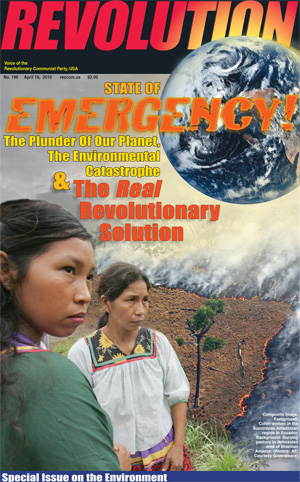
This Revolution special issue focuses on the environmental emergency that now faces humanity and Earth’s ecosystems. In this issue we show:
- the dimensions of the emergency...
- the source of its causes in the capitalist system, and the impossibility of that system solving this crisis...
- a way out and way forward for humanity—a revolutionary society in which we could actually live as custodians of nature, rather than as its plunderers.
Read online....
Also available in brochure format (downloadable PDF)
There were two other panelists who talked about movements for climate justice: in the U.S. and internationally, with one giving emphasis to organizers on a campus and the other discussing the climate justice protests that have taken place outside the summits of governments coming together to come to agreements on carbon usage and more. While there was important exposure about the climate situation, they were looking more internally at the character of the movements themselves and not whether those movements will actually deal with the problem as it is, and as it’s getting more dire.
I spoke from the floor and opened my comments disagreeing with the first panelist. Yes, we have to identify the problem but even if there were such a thing as “the enlightened 1%,” they can’t deal with this problem in any kind of way that will benefit humanity even if they wanted to. They are bound by the rules and dynamics of this system of capitalism-imperialism, and I spoke some about how that functions. The climate crisis is unresolvable under this system. I said that he was wrong about what a revolution is. In line with that, I appreciated the other panelist’s comments on the role of the state. This system is enforced by that state, and I again quoted the point above from Marx, that “you can’t lay hold of the ready-made machinery of the state.” That we have to make an actual revolution, where—in a revolutionary situation—a revolutionary people in their millions meets, defeats and dismantles that violent repressive apparatus and their institutions of power and replaces that with new institutions of power, and a new state that could actually lead to emancipation and provide a basis for human beings to actually be fit caretakers of the earth. And I encouraged people to get into BA’s work on all this.
Finally, while I think there was something to unite with among people who are fighting to do something about this, we can’t just set up arrangements that make us feel good while our planet burns. I asked people to comment on the following: We can’t all agree the patient is dying of cancer and then kid ourselves that cough syrup will cure it... we can’t say we all agree this is an emergency and then just put one foot in front of the other working on whatever is in front of us and hope somehow it will all work out in the end. We need the courage to confront the problem and seek out the solution that actually measures up to that.
The panel was nearing the end of its time, but one of the panelists spoke and said she appreciated what I said and was herself quite agonized about it, but didn’t have an answer. She was open to hearing radical answers but didn’t know herself how to approach that. This was very honest on her part and important—she didn’t try to promote illusions just to make people feel better.
* Finally, another significant thing that went on is that we were able, in the midst of the conference and its immediate aftermath, to have a few one-on-one meetings with professors to get more deeply into BA’s work and the work of The Bob Avakian Institute. In this we got more deeply into the struggle over the nature of the problem and solution, and the significance of Avakian’s work in speaking to and dealing with all that. And on the basis of opening up deeper engagement, talked about how they could be part of making this known more broadly. All offered their thinking and questions about the content of BA’s work, and committed to reading the new work, and as they were committing to this crucial process, weighed in on how to best get this work into the center of what is being taught and wrangled over in the study of human society on college campuses.
This whole experience—the response from people broadly to what Avakian’s work concentrates and how the urgently changing objective situation is impacting people—underscored how pressing and vital it is to really have Avakian’s work engaged throughout society. This also has a lot to do with the importance of going to this strata with a strategic orientation—aiming for nothing less than what BA describes as the “‘transfer of allegiance’ of a section of the intelligentsia” to the side of revolution and communism with “a very broad embrace, very wide arms, on the basis of being firmly grounded in the necessary solid core.” There is a big need and opportunity for all this right now with the upcoming release of THE NEW COMMUNISM. The need to make BA a point of reference and point of contention is palpable, and you can see—in just this tiny sample—that it could really make all the difference.
Volunteers Needed... for revcom.us and Revolution
If you like this article, subscribe, donate to and sustain Revolution newspaper.

